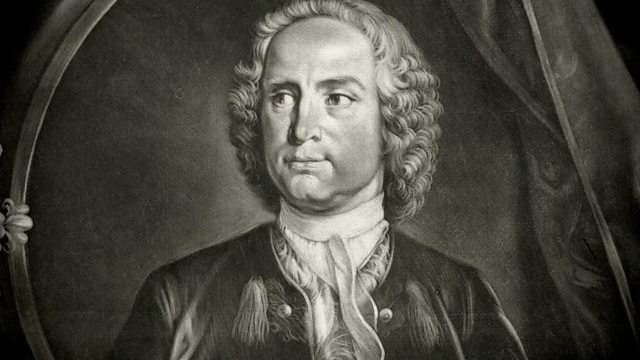
Pietro Locatelli may be best known to the modern public for a piece that does not actually exist. Master and Commander, the first novel in Patrick O'Brian's Aubrey-Maturin series, begins with the famous line: 'The music-room in the governor's house at Port Mahon, a tall, handsome, pillared octagon, was filled with the triumphant first movement of Locatelli's C major quartet.' In fact, Locatelli is not known to have written any quartets.
Locatelli was born in Bergamo. Little is known of his early life. He held the title of virtuoso in the musical establishment of the church of Santa Maria Maggiore in Bergamo. In 1711, at the age of 16 he moved to Rome to take advantage of the abundance of musical activities offered by its many chapels and private academies.
In 1723, he began his travels through Italy and Germany. Little is known of this period. He was named virtuoso da camera at Mantua in 1725, but freely pursued other engagements, including performances at Venice (1725), Bavaria (1727), and Berlin and Kassel (1728).
Most sources state that Locatelli did not like the narrow confines of court and church work and preferred to pursue his own interests. What we do know is that he settled in Amsterdam in 1729 staying there until his death in 1754. Amsterdam had an active cultural life and the prestige of the music publishers. Locatelli was able to devote himself to composition and, above all, to the publication and continual revision of his works.
He participated little in the city's music scene. He had no pupils and never played in public. On Wednesday evenings he did, however, give concerts in private houses, which were highly fashionable among the city's beau monde. Being a master at the violin, Locatelli preferred not to have any professional musicians attend, a suspected reason for which is that he was afraid of their imitating him.
Though his playing was highly praised, some observers found it too brilliant; likewise, the originality of his works was admired, while others criticized a lack of technique and invention. As a composer he focused on the sonata and concerto, achieving a fusion of sorts between the Roman and Venetian styles; his caprices for solo violin in L'arte del violino (Amsterdam, 1733) at one time earned him the title "Paganini of the 18th century." Locatelli's virtuosity is reflected in the Capricci through the use of high registers, double stopping, chords and arpeggios with wide fingering and overextension of the left hand, harmonics, trills in two-part passages, double trills, varied bow types and variable bowings.
Here's an example of the difficulty of his pieces:
This is caprice 23 that was inserted by the composer as the cadenza to the first movement of concerto 12 op. 3.
Sources - wiki, Bach Cantatas





